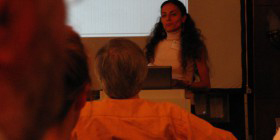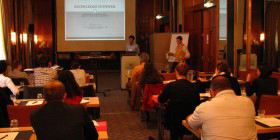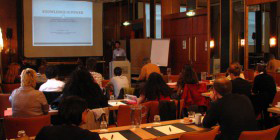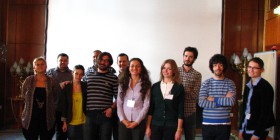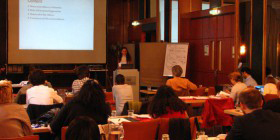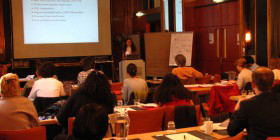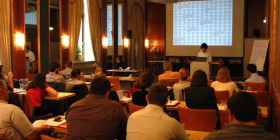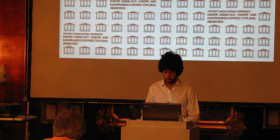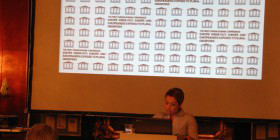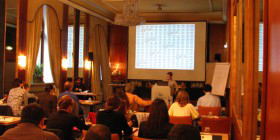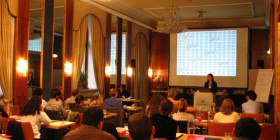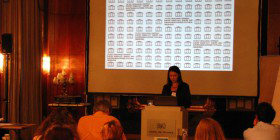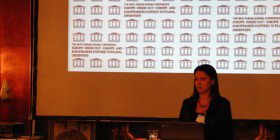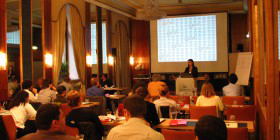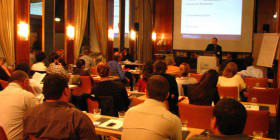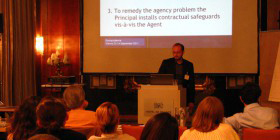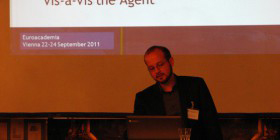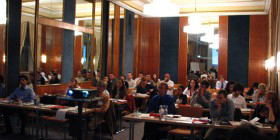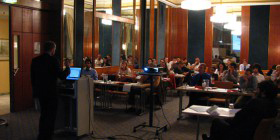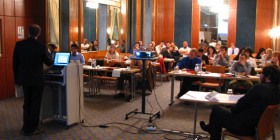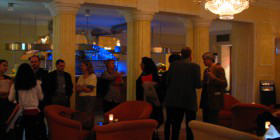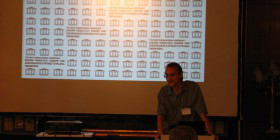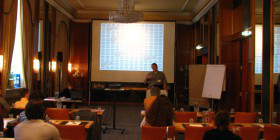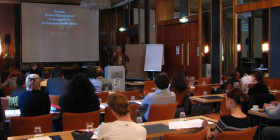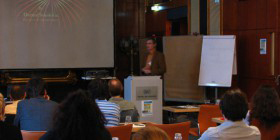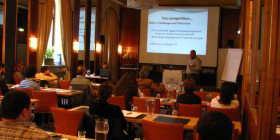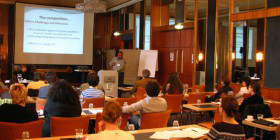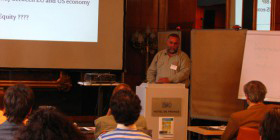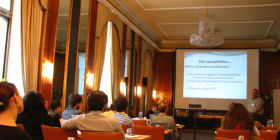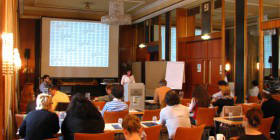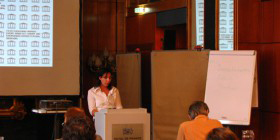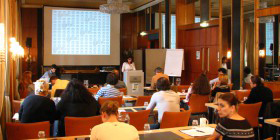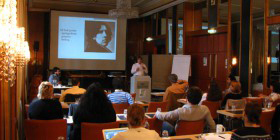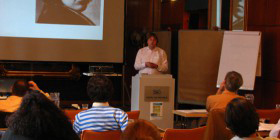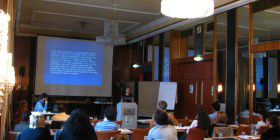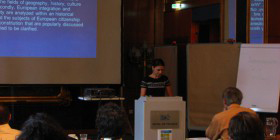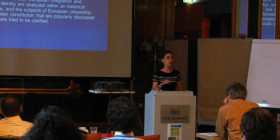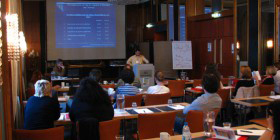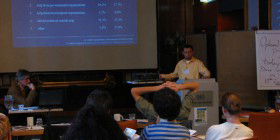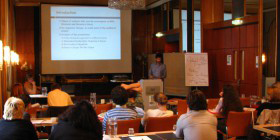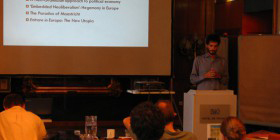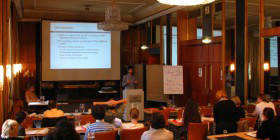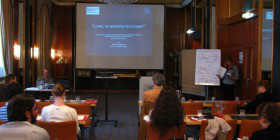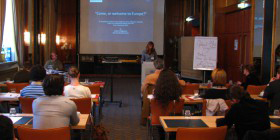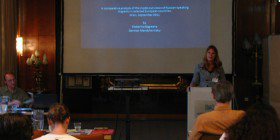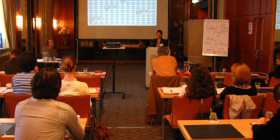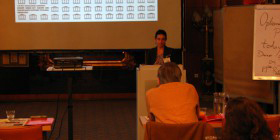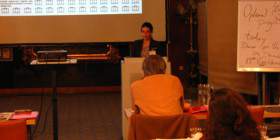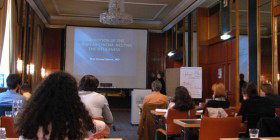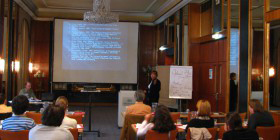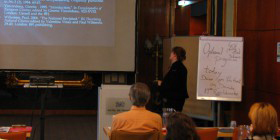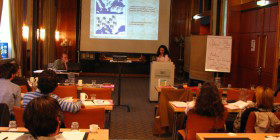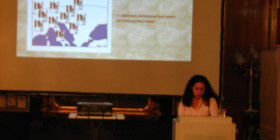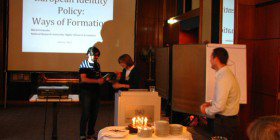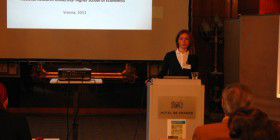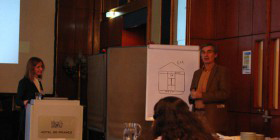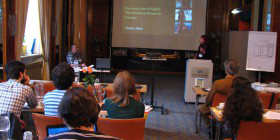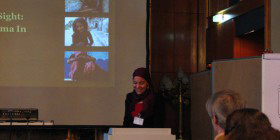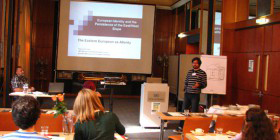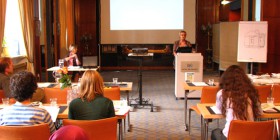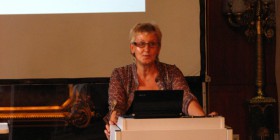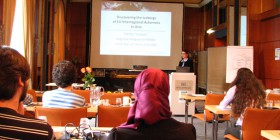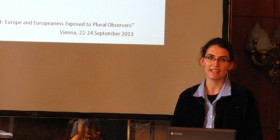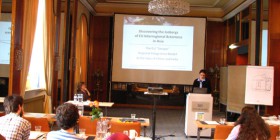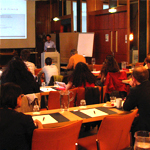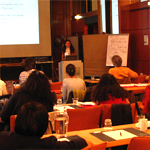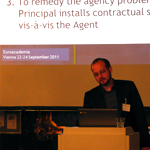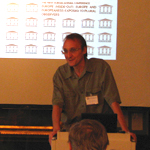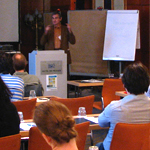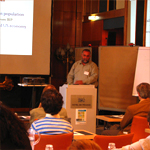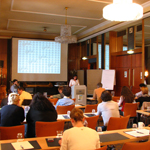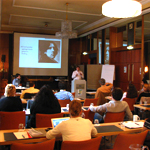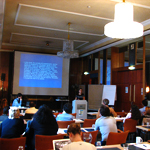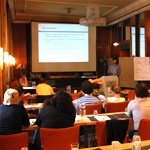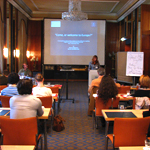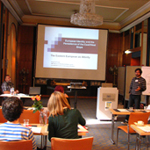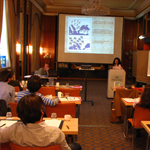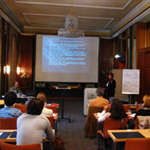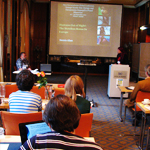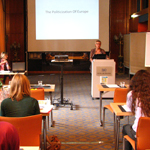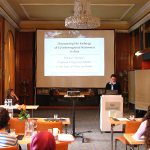Conference testimonials
Marius RaduPresident of DIANOIA
Thank you guys for a superb effort of bringing together special people and excellent topics. You did a great job with a great heart and bright logistic. Thank you for all, and mostly for good future taste of remembrance, networking and a foretaste of quality friendship...
Conference program
- September 22, 2011
- 13:00 - 13:30Registration
- 13:30 - 14:00Welcome and Opening Remarks
- 14:00 - 16:00Open Floor Workshop: Debating Europe (Speeches by ANDREI ZNAMENSKI and DZEMAL SOKOLOVIC)
- 16:00 - 16:30Coffee Break
- 16:30 - 19:00Panel 1 - Europe In The World: From Influence To Conflict Resolution And External Action Chair (Emanuel Crudu)
- 19:00 - 19:30Welcome Reception (Atrium)
- 19:30 - 22:30Dinner – Restaurant Hotel De France
- September 23, 2011
- 09:00 - 10:30Panel 2-Understandings Of Europe (Chair Nevena Dakovic)
- 10:30 - 11:00Coffee Break
- 11:00 - 12:30Panel 3 – The Multiple Faces of Europeanization As A Process (Chair Davide Bradanini)
- 12:30 - 13:30Lunch – Restaurant Hotel De France
- 13:30 - 15:00Panel 4 – European Social Models: Welfare States and Suspicions of Neoliberal Bias (Chair Dzemal Sokolovic)
- 15:00 - 15:30Coffee Break
- 15:30 - 17:30Panel 5 – Europe And Its Internal/External Others/Outsiders (Chair Andrei Znamenski)
- September 24, 2011
- 09:00 - 10:30Panel 6 – Europe And Identities (Chair Marius Radu)
- 10:30 - 11:00Coffee Break
- 11:00 - 13:00Panel 7 – The Politicization Of Europe (Chair Katalin Ferber)
- 13:00 - 13:30Closing Session
- September 22, 2011
The First Euroacademia Global Conference – Europe Inside-Out: Europe and Europeaness Exposed to Plural Observers
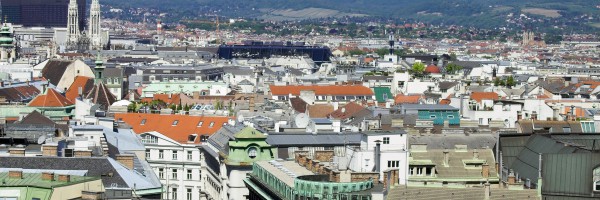
- Conference Description
- Participant’s Profile
- Registration and Fee
- Social Activities and Publication
- Important Dates
- Venue and Directions
- Panel 1
- Panel 2
- Panel 3
- Panel 4
- Panel 5
- Panel 6
- Panel 7
The First Euroacademia Global Conference
Europe Inside-Out: Europe and Europeaness Exposed to Plural Observers
Vienna, 22-24 September 2011
Europe became in the 20th century an elaborated yet contested notion as a particular field of European studies emerged and extensive and diverse research was directed recently towards an intensified search for what Europe is about. The creation of the European Union made things even more specialized and increased the stake of methodological rigor as more and more Europeans are affected by the decisions taken in Brussels. The number, diversity and quality of research projects focused on European issues is unprecedented, yet, as it is usually the case with specialization it gradually led to discursive communities that rarely meet and debate their approaches in open floors together with peers from other continents, academic traditions and cultures. It is the aim of this conference to build a bridge among specialists from different regions, academic traditions and cultures that share a common interest in studying and addressing Europe as a reflexive concern.
The first Global Conference ‘Europe Inside-Out: Europe and Europeaness Exposed to Plural Observers’ aims exactly to refresh a broader approach and understanding of Europe by enlarging the platform of regular conferences and workshops for a wider arena of participants and disciplinary backgrounds in order to put on stage a worldwide monadology for such concerns. The conference aims to enable critical alternatives to the disciplinary orthodoxy by creating a framework for interaction and dissemination of diversity that has to become once more a European trademark. The conference also aims to become a constructive confrontational space for alternative methodologies, provocative puzzles, inter, multi and trans-disciplinary understandings for wider and also for thinner specialized issues of concern on or about Europe of today. In a way, such a conference aims to become a moment of return to the European specificity of critical self-understanding through dialogue and debate with all the discursive or narrative traditions that directly or indirectly constitute its self.
What is Europe and its place in the world? Is there something particular that sedimented in time and through a controversial history a European way? How does Europe see itself and how do others see it? Is Europe inclusive or club-based exclusive? Is Europe becoming a normative power or just envisages itself as one? Is the European multiculturalism a fact or an ideal? Is the European Union a reflection of Europe or an appropriation of it? These are just few questions out of an enormous space for inquiry that are to be addressed and confronted within the topic of the conference.
The conference is addressed to academics, researchers and professionals with a particular interest in Europe and European Union from all parts of the world. As the nature of the conference is intended to be multidisciplinary in nature different academic backgrounds are welcomed.
Post-graduate students, doctoral candidates and young researchers are welcomed to submit an abstract. Representatives of INGOs, NGOs, Think Tanks and activists willing to present their work with impact on or influenced by specific understandings of the European Union are welcomed as well to submit the abstract of their contribution.
Abstracts will be reviewed and the participants are selected based on the proven quality of the abstract. The submitted paper for the conference proceedings is expected to be in accordance with the lines provided in the submitted abstract.
Participation fee: 295 Euro
The participation fee includes:
- the registration fee,
- all the materials of the conference
- a copy of the electronic volume to be published
- access to Euroacademia discussion group and newsletters
- discounted rates for participation in the future Euroacademia conferences
- coffee brakes with snacks for all the duration of the conference
- wine reception and a cocktail with buffet dinner at the 5 stars Hotel De France for 22 September
- a 3 course lunch on 23rd September at the 5 stars Hotel De France
- optional social program – visit at the museum
- certificate of attendance
Please be aware that the final confirmation of attendance will be considered upon payment of the participation fee until the 1st of August 2011 in the Euroacademia account:
Euroacademia (Verein für die Verbreitung der wissenschaftlichen Forschung)
Bank Austria
IBAN: AT18 1200052999307407
BIC: BKAUATWW
The participation fee can be paid through bank transfer. A confirmation of receipt will be sent to you by e-mail and the original invoice will be delivered to you on site at the conference.
Unfortunately, Euroacademia has no available funds for covering transport and accommodation in Vienna. Participants are responsible for finding funding to cover transportation and accommodation costs during the whole period of the conference. Official letters can be sent by Euroacademia to the financing institution to confirm the selection and participation in the conference upon request.
A specific spot in the conference program will be dedicated to social networking and therefore all the participants interested in setting or developing further cooperation agendas and prospects with other participants will have time to present and/or promote their project and express calls for cooperation.
A specific setting (Social Corner) for promotional materials connected with the topic of the conference will be reserved for the use of the participants. Books authored or edited by the participants can be exhibited and promoted during the whole period of the conference and can also be presented within the conference package based on prior arrangements.
An optional dinner and a social event will be organized for the second evening of the conference on a boat on the Danube river as optional program for the willing participants. The social dinner will be held based on participant’s confirmation and it costs 50 Euro to be covered by participants.
Publication:
Selected papers will be published in an electronic volume with ISBN after the confirmation of the authors and a double peer-review process based on an agreed publication schedule. All the papers selected for publication should be original and must have not been priory published elsewhere. All participants to the conference will receive a copy of the volume.
| Important Dates | |
|---|---|
| 15th of July 2011 | 300 words abstracts and details of affiliation |
| 20th of July 2011 | Notification of acceptance |
| 25thof July 2011 | Sending the participation form |
| 1st of August 2011 | Payment of the conference fee |
| 1st of September 2011 | Sending the draft paper to be uploaded on the web site of the conference |
| 10th of September | Publication of the conference program and uploading the draft papers on the website |
| 22nd of September | The conference commences |
The conference will take place in the events premises of the exclusive 5 stars Hotel de France, centrally located in the heart of Vienna and easily accessible from the historic area of the beautiful imperial town. It is located near the Stephans Dome, in the heart of the shopping and banking district of Vienna.

1010 Vienna, Schottenring 3
Tel.: +43 1 31 368 – 0
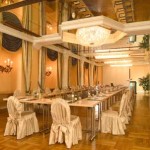
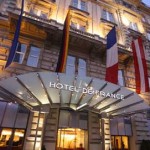
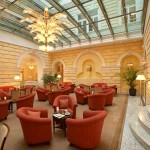
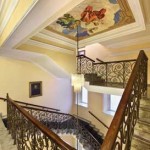

Vienna is a wonderful town with a rich history and a live full of cultural events.
For full information on Vienna as travel destination see the Vienna Destination Guide 2011: here
Europe In The World: From Influence To Conflict Resolution And External Action
(Chair Emanuel Crudu)
- Knowledge Is Power: Epistemic Communities And EU Crisis ManagementWhy and how do security institutions evolve? How has the European Union security architecture changed so rapidly over the past ten years, without member states agreeing on a common vision of European integration in this field?Giovanni Faleg, London School of Economics and Political Science
- External Democratization Efforts Of European Organizations In Armenia: Unintended Side Effects?The paper investigates the achievements and challenges of European organizations as external factors in promoting democracy-oriented reforms and democratic institution building in Post-Soviet Armenia.Anahit Babayan, University of Leipzig
- A European Affair: The Role Played By The EC In The Spanish Transition To DemocracyThe aim of this paper is to analyze the interaction of the domestic and international political actors during the Spanish transition to democracy between 1975 and 1977. It focuses on the role played by the European Community in the process of democratization in Spain, using transnational Socialist party activity as a prism through which to study the complex set of domestic and international variables at work in that process.Alan David Granadino Gonzalez, European University Institute
- Supervised Statehood In Kosovo: Co-shared Governance And The Erosion Of CitizenshipKosovo’s case presents a mixture of post-totalitarian politics with a post-war reality. Its deeply-divided society is struggling to solve the ethnic conflict while dealing with state-building and democratization.Alma Vardari-Kesler, Tel-Aviv University
- EU Conditionality In Sensitive Matters: Serbia’s Policy Towards KosovoThe unresolved Kosovo issue is considered a major factor of instability in the Balkans, since it is not only a dispute between Serbia and Kosovo, but it also undermines regional relations. The EU is interested in stability of the region and for the last ten years, it has played a major role in the Balkans.Maja Bogicevic, Central European University
- Re-examining The Principal-Agent Model In The Realm Of EU External RelationsThe Principal-Agent model has served as the basis for an extensive research agenda in examining matters of delegation between the Council and the Commission in the realm of EU external relations.Ioannis Spyridakis, Institute for European Studies, Vrije Universiteit
Understandings Of Europe
(Chair Neveda Dakovic)
- “European Miracle”: Warrior Aristocrats, Libertarian Spirit, and Competition as Discovery ProcessScholars noted that one of the characteristic aspects of European political identity is the existence of horizontal relationships among autonomous individuals and polities.Andrei Znamenski, The University of Memphis
- Europe: From the Champion of Cosmopolitism to European NationalismRecent Roma expulsions from France, Mrs Merkel’s, as well as Mr Cameron’s disappointment in multiculturalism, Swiss referendum on minarets, etc, raise one of ominous questions of the political and cultural future of Europe.Dzemal Sokolovic, Institute for Strengthening Democracy in Bosnia
- The Quest For A European ModelAfter 20 years of democratic freedom and after other 5 years of European integration, the citizens of Romania are still considered “a second hand” division of Europeans, struggling to find their place in the choir of equitable voices, as identity, rights and status/quo.Marius Radu, Dianoia
The Multiple Faces of Europeanization As A Process
(Chair Davide Bradanini)
- The Albanian Transition To Democracy as a Path to European IntegrationAlbania, like other post-communist East Central European countries, has been undergoing a multiple transition: a political transition from one party to many, an economic transition from command to market economy, and a social one, from rural society to an urban.Elda Gjergji, University of Elbasan “A.Xhuvani”
- Development Of Environmental Infrastructure In The EU: Possibilities For EvaluationWith total financial resources of €347 billion for the 2007-2013 planning period European Cohesion policy is the important topic of research for many both due to huge financial value as well as unprecedented number of participating states, sectors and goals.Jurijs Spiridonovs, University of Latvia
- From Universalism To Regionalism: Europeanization And Its Reflections Upon TurkeyEuropeanization is a new concept in the literature that has found its meaning with the political, economic and social inclusion of Central Eastern European (post-communist) countries in the process of European integration in 2004. The European Union (EU) through transferring its own values, norms and policies to member countries in the process of enlargement, has become a tool for establishing a new European identity.Cemile Arikoglu Unducu, Thrace University
European Social Models: Welfare States and Suspicions of Neoliberal Bias
(Chair Dzemal Sokolovic)
- “Is welfare fair?” A Comparative Study of Migrants‘ Aspirations And Welfare System Support From Germany And NorwayEurope is an attractive destination for different types of migration, and has already been so for several decades. One of the advantages migrants experience in this region are well developed welfare systems which have become an essential pull-factor for the Russian-speaking migrants, especially after the dissolution of the Soviet Union.German Mendzheritskiy, University of Applied Sciences and Arts
- Flex-able CapitalismThe fall of socialist systems in East and Central Europe has unintended consequences, such as surprising failures of previously strong economic and stable social regimes in the region. The „standard” neoliberal policy what was advised to the core countries (Poland, the Czech Republic and Hungary) have recently demonstrated the failure of neoliberal ideology and policy.Katalin Ferber, Freie University Berlin
- Entrare In Europa: Consensus And Transformation In Italian CapitalismThe aim of this paper is to analyze the moment of consensus within the Italian political economy that corresponded to the signing of the Maastricht treaty in 1992. In the following year, the social partners signed a tripartite agreement with the government that aimed at allowing Italy to respect the Maastricht criteria and thus joining the first group of the Eurozone, which it did at the end of the decade.Davide Bradanini, IMT Advanced Studies Institute
Europe And Its Internal/External Others/Outsiders
(Chair Andrei Znamenski)
- “Come, Or Welcome To Europe?” A Comparative Analysis Of The Inside-out Views Of Russian-Speaking Migrants In Selected European CountriesAfter the dissolution of the Soviet Union, many Russian-speaking migrants found it attractive to move to European countries such as Germany and Norway as a result of different push- and pull-factors, expecting to find a friendly environment and a new home.Ekaterina Bagreeva, Russian Economic University of G. V. Plekhanov
- Europe And Its “Accursed“ ShareOnce upon a time, in the middle eighties of Romania (before the ’89 revolution) one of the Romanian intellectuals ended up in the postmodern liberal capitalist country of Austria – more concretely in an Austrian mall. His greatest shock was not related to the abundance of goods and needs, but rather to the gift of free plastic bags.Dana Domsodi, Babes-Bolyai University
- The European Identity And The Persistence Of The East/West SlopeThe Eastern Enlargement took place within a framework of deeply asymmetric relations between the EU and the candidate countries (Moravcsik and Vachudova 2003). A robust theory of enlargement explains the interests driven determination of Central and Eastern European countries to join while they entrapped through strategic action the Western European side of the EU in its rhetoric of commitment to norms and values as inescapable arguments to enlarge (Schimmelfennig 2003; Schimmelfennig and Sedelmeier 2005).Emanuel Crudu, IMT Advanced Studies Institute
- Sceptical Images Of The European Union. Euroscepticism Of Turkish University StudentsThis study explores how Euroscepticism is [re]produced among a group of university students in the context of historical interpretations of European history and the image of EU. The data for this study was collected during a fieldwork conducted between 20 September 2006 and 1 June 2007 with a group of graduate students from Ankara University and Middle East Technical University in Ankara, Turkey.Zeliha Nilüfer Nahya, Independent Researcher
Europe And Identities
(Chair Marius Radu)
- European Identity Policy: Ways Of FormationThe story of the unsuccessful adoption of the European Constitution from the political perspective and the latest financial crisis and namely crisis of Euro zone and the economic situation in particular countries of the European Union (so called “PI(I)GS”) demonstrated a menace for the future of the European project.Maria Eremenko, National Research University - Higher School of Economics, Laboratory of Political Research, Moscow, Russia
- The Notion Of European Cinema: Nesting The OthernessThe concern of this paper is to analyse the construction and representation of Europe through the notion of the European Cinema offering the survey of its multiperspective and encompassing definitions. The notions of the European Cinema- understood as the exponent of the European (Cultural) identity – derive from twofold process.Nevena Dakovic, University of Arts
- Humans Out Of Sight: Stateless Roma In The European Union: 1990-2010Rather than the conceptually illusive foreigner, across time and space, Romani people were seen to embody what is alien and different. On their sudden arrival in the 14th and 15th centuries, the Roma were perceived by Europe, that was only just beginning to come under state organization and control, as alarming intruders, nomads without hearth or territory, and soon encountered distrust and rejection.Nermin Allam, University of Alberta
The Politicization Of Europe
(Chair Katalin Ferber)
- The Politicization Of Europe: The Emergence Of An European IdeologyThe European documents are standardized as criteria and they generate politicized values especially in the candidate countries for membership in the EU. This situation, without established solutions in practice, generates a phenomenon of creating an ideology of the EU.Liljana Siljanovska and Vlera Ejupi, South East European University
- Paraphrasing The Democracy In European Union’ TermsEuropean Union today stands on her continent as one of the most amazing human projects of the world. At the same time Europe, as the cradle of modern democracies has long been laid herself open to criticisms about the democratic deficit in this European Union.Sozer Cizmeci, Independent Researcher
- Discovering The Icebergs Of The EU Inter-regional Actorness in Asia: The EU As An Unique Regional Integration Model In The Eyes Of China And IndiaThe European Union is likely to differentiate itself from other international actors. It claims to be ‘unique’ and characterized by several distinctive features such as for example the EU’s model for regional integration.Roza Smolinska, Independent Researcher , Brugge, Belgium
- The European Union LegitimacyThe European Union is an organisation considered by all as a sui-generis, or supranational one. From its establishment till now it faced different challenges. One of them is the legitimacy issue which started to be a strong challenger immediately after the Maastricht treaty.Ylber Sela, South East European University











